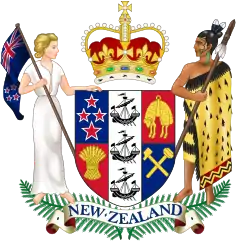Copyright Act 1994
The Copyright Act 1994 is an Act of Parliament passed in New Zealand that, along with its various amendments, governs copyright in New Zealand. It is administered by Intellectual Property Policy Unit of the Ministry of Business, Innovation and Employment.[1]
| Copyright Act 1994 | |
|---|---|
 | |
| New Zealand Parliament | |
| |
| Royal assent | 15 December 1994 |
| Commenced | 1 January 1995 |
| Amended by | |
| Copyright Amendment Act 1997 Copyright (Removal of Prohibition on Parallel Importing) Amendment Act 1998 | |
| Status: Current legislation | |
Scope of copyright
Copyright law grants the owner of the copyright exclusive rights to certain restricted acts, which include the following.[1]
- copying the work
- publishing, issuing or selling copies to the public
- performing, playing or showing the work in public
- broadcasting the work
- making any work derived or adapted from the copyright work.
Copyright works
Copyright automatically applies (no registration required) to original works in the following categories.[1]
- Literary works (novels, poems, song lyrics, computer programmes, compilations of data)
- Dramatic works (scripts for films or plays)
- Artistic works (paintings, plans, maps, photographs, sculptures, models, buildings)
- Musical works (scores and arrangements)
- Sound recordings (of musical, literary or dramatic works)
- Films
- Broadcasts (radio, TV, cable)
- Typographical arrangement of published editions (this exists independent of copyright in the published work, if any).
Copyright does not apply to certain government works, such as Acts of Parliament, Regulations, Parliamentary debates, Court judgements and reports of Select Committees, Royal Commissions, Commissions of Inquiry, etc.
Copyright term
The copyright term is largely consistent with other countries, although it has not increased from 50 to 70 years as in Europe and the United States, and varies with the category of the work.[1]
- Literary, dramatic, musical and artistic works; 50 years from the death of the author
- Artistic works industrially applied; 16 years from when the work is applied
- Artistic craftsmanship industrially applied; 25 years from when the work is applied
- Sound recordings and films; 50 years from when it is available to the public
- Broadcasts and cable; 50 years from broadcast
- Typographical arrangements; 25 years from first publishing.
- Computer-generated works; 50 years after being made.
- Crown copyright: 100 years
Exclusions and fair dealing
The Act allows for certain permitted acts to be exempted from copyright restrictions.
- Fair dealing; for purpose of criticism, review, news reporting, research, private study.
- certain educational purposes
- time shifting of TV programmes for viewing at a later time
- format shifting of music
- back up of computer programmes
- making copies in Braille.
Moral rights
The copyright act also provides moral rights for the author. These attach to the author, and are not transferred by contract as economic rights can be. Moral rights give the author the right;
- to be identified as the author (right of attribution)
- to object to derogatory treatment of the work (right of integrity)
- to not have work falsely attributed to them.
New technologies amendments
In 2001,[2] the MED initiated a major review of copyright law, in light of new technologies, such as media in digital form and communications via the internet.
Law changes were enacted in 2008, most notably the Copyright (New Technologies) Amendment Act.[3] These changes were influenced by media corporations and aligned organisations (RIANZ, APRA, Artists Alliance, NZSA, AIPA, NZIPP, etc.) but opposed by New Zealand artists,[4] technology specialists,[5] ISPs,[6] businesses,[7] media commentators,[8] librarians[9] and members of the public.[10] The nature of the law changes attracted attention internationally.[11]
The New Zealand Prime Minister, John Key, stated that the stronger copyright laws, including the controversial section 92a, were required for New Zealand to be able to negotiate a free trade agreement with America.[12]
In February 2010, a Bill repealing s92a was introduced to parliament, replacing it with a three notice regime for copyright infringement via file sharing.[13] The bill also provides for the Copyright Tribunal to hear complaints and award penalties of up to $15,000.[14] The notice regime took effect on 1 September 2011.[15]
See also
References
- "Copyright protection in New Zealand | Ministry of Business, Innovation & Employment". www.mbie.govt.nz. Retrieved 21 January 2020.
- "Digital Technology and the Copyright Act 1994: A Discussion Paper". MED. July 2001.
- "Section 92a of the Copyright Act". New Zealand government.
- "Section 92 of the Copyright Amendment Act assumes Guilt Upon Accusation". Creative Freedom NZ. Archived from the original on 27 February 2009. Retrieved 5 June 2013.
- Wallace, Brenda (12 November 2008). "Say good bye to freedom on the internet - was nice while it lasted". Archived from the original on 6 December 2008. Retrieved 5 June 2013.
- Keall, Chris (21 January 2009). "ISPs: New copyright law puts business in the gun; scrap it". Archived from the original on 22 January 2009. Retrieved 5 June 2013.
- "Guilt Upon Accusation: New Zealand Businesses". Creative Freedom NZ. Archived from the original on 24 July 2011.
- Jackson, Colin (7 October 2008). "Ministers: why we changed the Copyright Act".
- "Now librarians come out against copyright law". Computerworld. 20 January 2009. Archived from the original on 27 February 2009. Retrieved 5 June 2013.
- Pilcher, Pat (13 January 2009). "Is the new copyright law a lose-lose proposition?". New Zealand Herald.
- Gibbs, Mark (20 February 2009). "New Zealand gets insane copyright law". ComputerWorld. Archived from the original on 2 March 2007. Retrieved 9 July 2019.
- "Key: We still need a new internet copyright law". NZPA. 24 February 2009.
- Power, Simon (23 February 2010). "Section 92A bill introduced to Parliament today".
- http://www.lawdownunder.com/nz-copyright-infringement-regime-illegal-file-sharing/. Missing or empty
|title=(help) - Walls, Alex (4 August 2011). "'Three strikes' file sharing law coming sooner than you think". Archived from the original on 2 April 2012. Retrieved 10 August 2011.